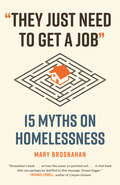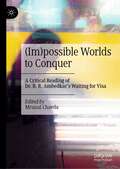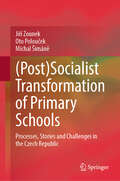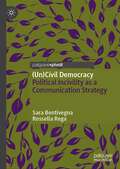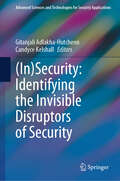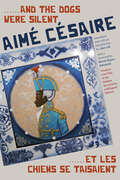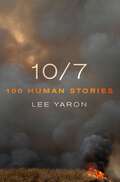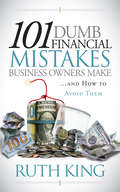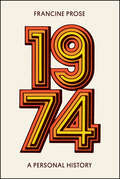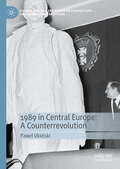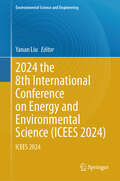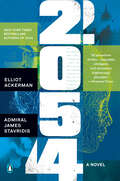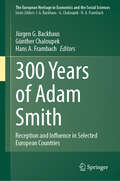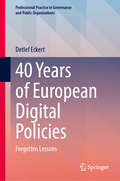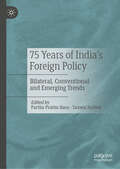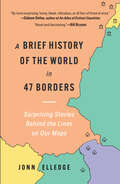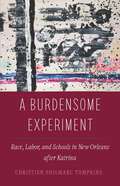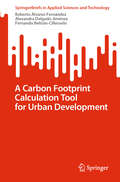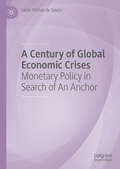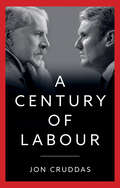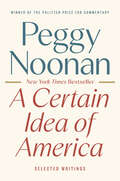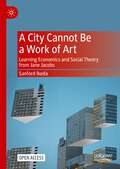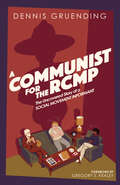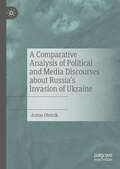- Table View
- List View
"They Just Need to Get a Job": 15 Myths on Homelessness (Myths Made in America #10)
by Mary Brosnahan&“Readers will come away infuriated, with a greater understanding of the systemic causes of homelessness, and with more compassion for their homeless neighbors. Essential reading for any community affected by homelessness (which is all of them).&” —Booklist, Starred ReviewFor readers of Andrea Elliott and Matthew Desmond, the former CEO of the Coalition for the Homeless breaks through the highly destructive misinformation surrounding our homeless neighborsConservative think tanks like the Manhattan Institute disseminate anti-homeless myths in the media, legislatures, and the larger culture, claiming that our homeless neighbors cause their own predicament and that the best we can do is manage the problem.Drawing on her deep legal knowledge, policy expertise, and decades of frontline service, Mary Brosnahan cuts through the misinformation to deliver two important messages: that homelessness ultimately stems from a lack of investment in affordable housing; and that the greatest myth of all is that we should have no hope. In fact, the proven solutions are well documented, and the ability to enact them depends on us all.Brosnahan takes a nationwide look from New York to Detroit, Philly to L.A., and from rural areas such as Cumberland County, Pennsylvania to debunk 15 widespread misconceptions, including:that the problem is inevitable (in fact, Housing First approaches have shown great success)that &“handouts&” cause homelessness (in fact, the primary causes are flat wages and high rent)that homeless people need to prove that they&’re &“ready&” to receive aid (in fact, enforcing hurdles is far more expensive and less effective than Housing First).With brilliant insight, Brosnahan showcases how by dispelling these pervasive myths rooted in fear, we can embrace the affordable, housing-based solutions that will bring our impoverished neighbors home.
(Im)possible Worlds to Conquer: A Critical Reading of Dr. B. R. Ambedkar’s Waiting for Visa
by Mrunal ChavdaWith multidisciplinary examination, this book explores Waiting for Visa, Ambedkar's autobiographical writing. This investigation ranges from Dalit Studies to Discourse analysis. It aims to provide the reader with in-depth knowledge of Ambedkar's unexplored autobiographical memoir and supplement a range of generalized works. The issues addressed in this book are essential to Ethnic and Race studies in general, to which Dalit Studies is but one contributing discipline. The Dalit Studies already have many texts. These texts are primarily concerned with Dalit identity politics, socio-mythological explorations, and Ambedkarian thoughts on economics, politics, and racial-religious discriminations. These are not discussed with Ambedkar's life stories narrated by himself. This book bridges the gap between Dalit Studies and Ambedkar Studies to project how Ambedkar attempted to forge into an impregnable South Asian social, educational, and political fabric. This reference book aims to attract academics and students of Asian, South Asian, and Dalit Studies. The book appeals to educators, policymakers, and comparative literary scholars.
(Post)Socialist Transformation of Primary Schools: Processes, Stories and Challenges in the Czech Republic
by Jiří Zounek Oto Polouček Michal ŠimáněThis book addresses the transformation of primary education in the former Czechoslovakia (now the Czech Republic) after the fall of the communist regime in 1989. It follows the overall transformation of education and school policy and offers original insights into the everyday life of the schools at that time. It also provides a unique perspective on the whole transformation process. The work discusses the school environment in the context of specific local characteristics, such as parents, community, regional institutions, and national and international contexts. The book specifically focuses on the changes in primary school management in terms of economics, organization, and personnel. The processes of pedagogical change are an essential theme of the book. They cover how teachers proceeded through the changes in their work at the time of the transformation and the reasons for their resistance to change, including the challenges that the transformation introduced into their work and personal lives. The book also monitors how the teachers navigated the selection and use of new textbooks and tools, such as digital tools. The work originates in historical-pedagogical research, based primarily on the oral history method and complemented by the study of contemporary documents.
(Un)Civil Democracy: Political Incivility as a Communication Strategy
by Sara Bentivegna Rossella RegaThis book offers a systematization of the recourse to political incivility by different subjects and in different contexts. The authors argue that incivility has now become a strategic resource that can be used by various actors in the public arena to achieve specific goals. We are referring not only to traditional political subjects, but also to journalists, citizens, movements and protest groups, that is to a plurality of actors who, from different angles, contribute to the construction of the “political spectacle”. This resource can be activated according to circumstances and conveniences, whether their nature be political (to place an issue at the center of public debate or a new actor in the offer range), mediatic (to achieve an increase in visibility or viewership) or relational (to expand one’s visibility and centrality in social media). The book identifies common elements linking the different levels of use of incivility, which can be traced in uncivil forms of communication. These are their expressive power (memorable gestures and unequivocal messages, which are immediately recognizable and visible), their aggregation power (they build group identities, and consolidate allegiances and bonds) and their mobilization power (they galvanize people, and inspire them to participate and take action).
**Missing** (Advanced Sciences and Technologies for Security Applications)
by Gitanjali Adlakha-Hutcheon Candyce KelshallWhat does it take to disrupt security? How does one disrupt the invisibility of insecurity? How does one make the invisible factors that define and impact security visible? For a start, by giving voice to the unheard and the marginalized, engaging non-traditional understandings of security that might bring to light the cracks in our current security infrastructure and expose the insecurities that are hidden in plain sight. These voices include generational, geographic, cultural, ethnic, and gender-based perspectives of insecurity which are ignored, or simply cannot be heard, by traditional notions of security. Presently there is a lack of understanding of the language of nuanced hate being whispered from the ground that inform civil discord. These call for new intrastate actions that need to be taken to make communities safer and building layers of protective resilience into the continuing existence of the state. Unresolved grievances lay the foundation for insecurity and instability for the future at a time when states need cohesiveness more than ever and there are significant invisible insecurities, external to the state, that need to be revealed. The tapestry of interrelationships that enable security within a state requires equity, access, and agency among communities. If we are to achieve this, we must learn to see the invisible, listen to the unheard, and move beyond our static conceptions of security. In so doing we build more resilient societies in the face of a dynamic threat environment and ensure the peaceful continued existence of states. This book is a sounding board for positive disruption, a source for alternative theories, tools, and models to aid mitigation of the whispered threats and the soft violence which accompanies chauvinism of any one way of being. In this edited book the multiplicity of factors that impact security is explored through new lenses to glean insights, such that we are better equipped to prevent harm and protect our security.
......And the Dogs Were Silent/......Et les chiens se taisaient
by Aimé CésaireAvailable to readers for the first time, Aimé Césaire’s three-act drama . . . . . . And the Dogs Were Silent—written during the Vichy regime in Martinique in 1943 and lost until 2008—dramatizes the Haitian Revolution and the rise and fall of Toussaint Louverture as its heroic leader. This bilingual English and French edition stands apart from Césaire’s more widely known 1946 closet drama. Following the slave revolts that sparked the revolution, Louverture arrives as both prophet and poet, general and visionary. With striking dramatic technique, Césaire retells the revolution in poignant encounters between rebels and colonial forces, guided by a prophetic chorus and Louverture’s steady ethical and political vision. In the last act, we reach the hero’s betrayal, his imprisonment, and his last stand against the lures of compromise. Césaire’s masterwork is a strikingly beautiful and brutal indictment of colonial cruelty and an unabashed celebration of Black rebellion and victory.
10/7: 100 Human Stories
by Lee YaronThe definitive account of the 10/7 attacks through the stories of its victims and the communities they called home.On October 7, 2023—the Sabbath and the final day of the holiday of Sukkot—the Gaza-based terror group Hamas launched an unprecedented assault on the people of Israel. Crashing through the border, attacking from the sea and air, militants indiscriminately massacred civilians in what became one of the worst terror attacks in modern history, and the most lethal day for the Jewish people since the Holocaust.A radically passionate work of investigative journalism and political critique by acclaimed Haaretz reporter Lee Yaron, 10/7 chronicles the massacre that ignited a war through the stories of more than 100 civilians. These stories are the products of extensive interviews with survivors, the bereaved, and first responders in Israel and beyond. The victims run the gamut from left-wing kibbutzniks and Burning Man-esque partiers to radical right-wingers, from Bedouins and Israeli Arabs to Thai and Nepalese guest workers, peace activists, elderly Holocaust survivors, refugees from Ukraine and Russia, pregnant women, and babies.At a time when people are seeking a deeper understanding of the history of the Israeli-Palestinian conflict and how internal political turmoil in Israel has affected it, they predominantly encounter perspectives from the powerful—from politicians and military officers. 10/7 takes a fresh approach, offering answers through the stories of everyday people, those who lived tenuously on the border with Gaza.Yaron profiles victims from a wide range of communities—depicting the fullness of their lives, not just their final moments—to honor their memories and reveal the way the attack ripped open Israeli society and put the entire Middle East on the precipice of disaster. Each chapter begins with a portrait of a community, interweaving history with broader political analysis of the Israeli-Palestinian conflict to provide context for the narratives that follow. Ultimately, 10/7 shows that the tragedy is much greater than the violence of the attacks, and in fact extends back through the entire Netanyahu era, which propagated a false image of Israel as a technologically advanced, militarily formidable powerhouse so essential to the region that it could continue to ignore and undermine Palestinian statehood indefinitely.
101 Dumb Financial Mistakes Business Owners Make and How to Avoid Them
by Ruth KingMany business owners downplay the importance of managing their finances—until they’re in trouble. When a business can’t meet payroll and supplier bills are overdue, when a loyal customer leaves and there’s a huge tax bill looming, that’s when owners discover the 101 Dumb Financial Mistakes they’ve been making. 101 Dumb Financial Mistakes and How to Avoid Them helps business owners prevent these mistakes before it is too late and they are in the middle of a financial crisis. Ruth King’s 101 Dumb Financial Mistakes and How to Avoid Them reveals common mistakes that can happen in any business: from pricing and Profit & Loss Statement issues to theft and Balance Sheet mistakes. With over 40 years of experience working with business owners, Ruth King has seen these mistakes repeatedly. She created 101 Dumb Financial Mistakes and How to Avoid Them as a resource for business owners to avoid many common mistakes by providing them the tools they need to avoid sleepless nights and worry.
1974: A Personal History
by Francine Prose“In this remarkable memoir, the qualities that have long distinguished Francine Prose’s fiction and criticism—uncompromising intelligence, a gratifying aversion to sentiment, the citrus bite of irony—give rigor and, finally, an unexpected poignancy to an emotional, artistic, and political coming-of-age tale set in the 1970s—the decade, as she memorably puts it, when American youth realized that the changes that seemed possible in the ’60s weren’t going to happen. A fascinating and ultimately wrenching book.”—Daniel Mendelsohn, author of The Lost: A Search for Six of Six MillionThe first memoir from critically acclaimed, bestselling author Francine Prose, about the close relationship she developed with activist Anthony Russo, one of the men who leaked the Pentagon Papers--and the year when our country changed.During her twenties, Francine Prose lived in San Francisco, where she began an intense and strange relationship with Tony Russo, who had been indicted and tried for working with Daniel Ellsberg to leak the Pentagon papers. The narrative is framed around the nights she spent with Russo driving manically around San Francisco, listening to his stories--and the disturbing and dramatic end of that relationship in New York.What happens to them mirrors the events and preoccupations of that historical moment: the Vietnam war, drugs, women's liberation, the Patty Hearst kidnapping. At once heartfelt and ironic, funny and sad, personal and political, 1974 provides an insightful look at how Francine Prose became a writer and artist during a time when the country, too, was shaping its identity.
1989 in Central Europe: A Counterrevolution (Central and Eastern European Perspectives on International Relations)
by Paweł UkielskiThe literature on the fall of communism contains numerous interpretations of the changes that took place in Central and Eastern Europe in 1989, while debates about how best to characterize the fall of the communist regimes have raged for many years. Researchers continue to ponder and argue over how ‘revolutionary’, as opposed to ‘evolutionary’ (or ‘reformatory’) these changes were. In this new study, author Paweł Ukielski proposes the term ‘counterrevolution’ to describe the historical process that took place and uses it as an analytical construct to better understand the crisis of Soviet communism and the subsequent transitions that took place.
2024 the 8th International Conference on Energy and Environmental Science: ICEES 2024 (Environmental Science and Engineering)
by Yanan LiuThis book dedicates to publish exceptionally important and high-quality, agenda-setting research so as to tackle the key global and societal challenges of ensuring the provision of energy and protecting our environment for the future. The book appeals to chemical scientists, chemical and process engineers, energy researchers, bio-scientists and environmental scientists from across academia, industry and government. The scope is intentionally broad, and the book recognizes the complexity of issues and challenges relating to energy conversion and storage, alternative fuel technologies and environmental science. The main topics of this book include but not limit to (1) alternative energy and the environment, (2) assessments of the condition of ecosystems and environmental quality, (3) behavior of and impacts of pollutants in atmosphere, soil and water, (4) management of ecosystems, environment and water resources, (5) modeling and regional environmental assessments (includes global change), (6) treatment/restoration of ecosystems, environment and water resources, (7) sustainable/renewable energy and(8) energy and built environment. All scales of studies and analysis, from impactful fundamental advances, to interdisciplinary research across the (bio)chemical, (bio/geo)physical sciences and chemical engineering disciplines are welcomed. So, this book is linked to the energy-environment nexus and is of significant general interest to our community-spanning readership.
2054: A Novel
by Elliot Ackerman Admiral James StavridisFrom the acclaimed authors of the runaway New York Times bestseller 2034 comes another explosive work of speculative fiction set twenty years further in the future, at a moment when a radical leap forward in artificial intelligence combines with America&’s violent partisan divide to create an existential threat to the country, and the worldIt is twenty years after the catastrophic war between the United States and China that brought down the old American political order. A new party has emerged in the US, one that&’s held power for over a decade. Efforts to cement its grip have resulted in mounting violent resistance. The American president has control of the media, but he is beginning to lose control of the streets. Many fear he&’ll stop at nothing to remain in the White House. Suddenly, he collapses in the middle of an address to the nation. After an initial flurry of misinformation, the administration reluctantly announces his death. A cover-up ensues, conspiracy theories abound, and the country descends into a new type of civil war.A handful of elite actors from the worlds of computer science, intelligence, and business have a fairly good idea what happened. All signs point to a profound breakthrough in AI, of which the remote assassination of an American president is hardly the most game-changing ramification. The trail leads to an outpost in the Amazon rainforest, the last known whereabouts of the tech visionary who predicted this breakthrough. As some of the world&’s great powers, old and new, state and nonstate alike, struggle to outmaneuver one another in this new Great Game of scientific discovery, the outcome becomes entangled with the fate of American democracy.Combining a deep understanding of AI, biotech, and the possibility of a coming Singularity, along with their signature geopolitical sophistication, Elliot Ackerman and Admiral James Stavridis have once again written a visionary work. 2054 is a novel that reads like a thriller even as it demands that we consider the trajectory of our society and its potentially calamitous destination.
300 Years of Adam Smith: Reception and Influence in Selected European Countries (The European Heritage in Economics and the Social Sciences #27)
by Günther Chaloupek Hans A. Frambach Jürgen G. BackhausTo mark the 300th anniversary of Adam Smith’s birth, the 37th Heilbronn Symposium on Economics and the Social Sciences was dedicated to his outstanding oeuvre, but above all to his most famous work, “An Inquiry into the Nature and Causes of the Wealth of Nations” (1776), which is regarded as a keystone of modern economics. The influence of Smith’s doctrine has made a lasting contribution to the development of a modern understanding of society and the economy and, in particular, the functioning of markets. This is not least because of the breadth of his approach, with overlaps between political economy, social philosophy and ethics. The planned volume builds on the current state of Smith research and also provides new insights into the dissemination of Smith’s ideas in German-speaking countries, but also in Scandinavia and Eastern Europe.
40 Years of European Digital Policies: Forgotten Lessons (Professional Practice in Governance and Public Organizations)
by Detlef EckertWritten by a seasoned European Commission official and industry expert with over 30 years of experience, this book invites you to embark on a journey through Europe's digital evolution. It provides an insightful guide to the policies that have positioned the EU as a catalyst for Europe’s digital transformation. The book serves as a historical narrative and an indispensable resource for policymakers and academics alike. Readers will learn from past triumphs and pitfalls to forge a path towards sustainable growth, innovation, and entrepreneurship. Presenting the rationale behind key policy decisions, the author unveils the dynamics shaping Europe's digital landscape. From pivotal moments to technological leaps, the book illustrates how the process of European integration has increasingly empowered policymakers to shape outcomes. Understanding this interplay between technology and policy is crucial for grasping the complexities of digital policymaking. Accessible to all, this book enhances technical explanations with legal and economic insights. By doing so, it enables readers to understand the nuances of digital policymaking and to envision a future for a digitally integrated Europe.
75 Jahre Grundgesetz: Wie sich die Gewaltenteilung im Lauf der Zeit verändert hat
by Jochen TheurerDieses aufschlussreiche Buch beschreibt, wo und wie sich die Macht heute in Deutschland tatsächlich verteilt. Obwohl Art. 20 Abs. 2 GG noch genauso lautet wie 1949, hat sich das Verhältnis zwischen Exekutive, Legislative und Judikative zum Teil stark verändert. Beispielsweise ist das Bundesverfassungsgericht im Verhältnis zum Bundestag tendenziell mächtiger geworden und treibt das Parlament durch bahnbrechende Entscheidungen immer wieder vor sich her – vom Recht auf informationelle Selbstbestimmung über das „3. Geschlecht“ bis hin zum Klimaschutz. Zudem spielen internationale Player eine immer größere Rolle: War das Grundgesetz vor 75 Jahren die höchste Rechtsnorm in Deutschland, bestreitet mittlerweile kein Jurist mehr ernsthaft den Vorrang von EU-Recht vor der deutschen Verfassung. Dieser informative Einblick in die komplexe Welt des Rechts stellt anschaulich dar, wie sich der Inhalt von Gesetzen trotz identischem Wortlaut verändern kann.
75 Years of India’s Foreign Policy: Bilateral, Conventional and Emerging Trends
by Partha Pratim Basu Tanwir ArshedThis book deals with pertinent issues and frameworks that will help readers map the course of India’s Foreign Policy and its strategies. Divided in four broad sections, it aims to understand the trajectories that have shaped India’s geopolitical and geostrategic manoeuvres and highlights some of the emerging dimensions of India’s foreign policy.
A Brief History of the World in 47 Borders: Surprising Stories Behind the Lines on Our Maps
by Jonn Elledge#1 International Bestseller Every border tells a surprising story in this uncommonly enlightening history that will change the way you understand the world “A novel and fascinating perspective on world history.”—Bill Bryson, author of A Short History of Nearly Everything Many lines on the map are worth far more than a thousand words, going well beyond merely marking divisions between nations. In this eye-opening investigation into the most remarkable points on the map, a single boundary might, upon closer inspection, reveal eons of history—from epic tales of conquest, treaties, and alliances to intimate, all-too-human stories of love, greed, and folly. Sometimes rooted in physical geography, sometimes entirely arbitrary, none of the lines we know today were inevitable, and all might have looked quite different if not for the intricate interplay of chance and ambition. By listening to the stories these borders have to tell, we can learn how political identities are shaped, why the world’s boundaries look the way they do—and what they tell us about our world and ourselves. From the very first maps in Egypt to the Roman attempts to define the boundaries of civilization, from the profound shift in meaning of the Mason–Dixon line to the secret British-French agreement to carve up the Ottoman Empire during the First World War, and from the dark consequences of Detroit’s city limits to the intriguing reason why landlocked Bolivia still maintains a navy, this is a singular look at human history—told through its most spellbinding border stories.
A Burdensome Experiment: Race, Labor, and Schools in New Orleans after Katrina (Atelier: Ethnographic Inquiry in the Twenty-First Century #18)
by Christien Philmarc TompkinsA free ebook version of this title is available through Luminos, University of California Press's Open Access publishing program. Visit www.luminosoa.org to learn more. In the aftermath of Hurricane Katrina, the New Orleans public school board fired nearly 7,500 teachers and employees. In the decade that followed, the city created the first urban public school system in the United States to be entirely contracted out to private management. Veteran educators, collectively referred to as the "backbone" of the city's Black middle class, were replaced by younger, less experienced, white teachers who lacked historical ties to the city. In A Burdensome Experiment, Christien Philmarc Tompkins argues that the privatization of New Orleans schools has made educators into a new kind of racialized worker. As school districts across the nation backslide on school integration, Tompkins asks, who exactly deserves to teach our children? The struggle over this question exposes the inherent antiblackness of charter school systems and the unequal burdens of school choice.
A Carbon Footprint Calculation Tool for Urban Development (SpringerBriefs in Applied Sciences and Technology)
by Roberto Álvarez-Fernández Alexandra Delgado-Jiménez Fernando Beltrán-CillerueloThis book introduces an indispensable tool: the carbon footprint calculator for urban planning. In the face of the escalating climate crisis, urban planning finds itself at a critical juncture. By considering the evolution of urban planning and its connections to environmental issues, the book sheds light on the urgent need to reimagine city planning within a climate-conscious framework. This book presents a meticulous assessment of future uses and activities that generate greenhouse gas emissions, along with an examination of land use changes that impact the carbon-absorbing capacity of the soil. Mitigation strategies, such as leveraging renewable energy sources for self-generation, are explored and quantified whenever possible. Carbon Footprint Planning explains the essential activities that must be included in urban planning instrument applications for approval, emphasizing the significance of integrating ordinary or simplified strategic environmental assessment procedures. By doing so, potential environmental impacts, specifically in relation to climate change, are effectively evaluated and addressed. With the aid of the carbon footprint calculator, decision-makers will gain the ability to select the path of least carbon emissions from a range of alternatives, unveiling aspects that contribute to significant emissions during the early stages of urban development, such as master planning. In essence, this book equips urban planners and environmental enthusiasts alike with the tools and insights needed to navigate urban growth amidst the climate crisis, ensuring a sustainable and resilient future for our cities.
A Century of Global Economic Crises: Monetary Policy in Search of An Anchor
by Lúcio Vinhas de SouzaThis book explores the end of the era of low inflation and stable price increases, known as “The Great Moderation”, and the impact this will have on monetary policy. The macroeconomic trends and economic policy issues observed within developed countries over the last 70 years are linked with the economic theory debates of the time to highlight how the current economic challenges came about. The limitations of past economic policies are highlighted to help create a new policy framework for an era defined by high inflation, low economic growth, large budget deficits, and increased private sector debt.This book presents a new understanding of monetary policy that engages with the changing behaviour of economic agents. It will be relevant to researchers and policymakers interested in monetary policy and the political economy.
A Century of Labour
by Jon CruddasBritain’s first Labour government took office on 22 January 1924. Its centenary provides an opportunity to reassess the party's performance over the last 100 years, and with an election pending, the character and purpose of the modern party. Labour defined the dominant political settlement of much of the Twentieth Century: the welfare state. It has achieved much in pursuit of material change, social reform and equality. It has challenged patriarchy, racism and the legacy of imperialism, promoted human rights and delivered democratic and constitutional renewal. Yet any honest assessment must acknowledge a century littered with failures and missed opportunities. In this compelling book, Jon Cruddas, one of the country's foremost experts on Labour politics, details the vivid personalities and epic factional battles, the immense achievements and profound disappointments that define a century of Labour. Uniquely framed around competing visions of socialist justice within the Party, he provides a way to rethink Labour history, the divisions and factions on the left and to reassess key figures at the helm of the movement from Keir Hardie through to Keir Starmer.
A Certain Idea of America: Selected Writings
by Peggy NoonanFrom Pulitzer-prize winning Wall Street Journal columnist and New York Times bestselling author Peggy Noonan, a masterclass in how to see and love America. For a quarter century, Peggy Noonan has been thinking aloud about America in her much-loved Wall Street Journal column. In this new collection of her essential recent work, Noonan demonstrates the erudition, wisdom and humor that have made her one of America’s most admired writers. She calls balls and strikes on the political shenanigans of recent leaders and she honors the integrity of great Americans, ranging from Billy Graham to the heroes of 9/11. A thinker who never allows her tenderness to slip into sentimentality, she writes with clear-eyed urgency about the internal and external dangers facing our republic. She sometimes writes with indignation, but above all she writes with love— and an enduring faith that America can be its best self, that its ideals are worth protecting, and that beauty and heroism can be found in our neighbors, in our history, and in ourselves. This book is a celebration of what America has been, is, and can be. <br><b>New York Times Bestseller</b></br>
A City Cannot Be a Work of Art: Learning Economics and Social Theory From Jane Jacobs
by Sanford IkedaThis open access book connects Jane Jacobs's celebrated urban analysis to her ideas on economics and social theory. While Jacobs is a legend in the field of urbanism and famous for challenging and profoundly influencing urban planning and design, her theoretical contributions – although central to her criticisms of and proposals for public policy – are frequently overlooked even by her most enthusiastic admirers. This book argues that Jacobs’s insight that “a city cannot be a work of art” underlies both her ideas on planning and her understanding of economic development and social cooperation. It shows how the theory of the market process and Jacobs’s theory of urban processes are useful complements – an example of what economists and urbanists can learn from each other. This Jacobs-cum-market-process perspective offers new theoretical, historical, and policy analyses of cities, more realistic and coherent than standard accounts by either economists or urbanists.
A Communist for the RCMP: The Uncovered Story of a Social Movement Informant
by Dennis GruendingIn 1941, the RCMP recruited Frank Hadesbeck, a Spanish Civil War veteran, as a paid informant to infiltrate the Communist Party. For decades, he informed not only upon communists, but also upon hundreds of other people who held progressive views. Hadesbeck’s “Watch Out” lists on behalf of the Security Service included labour activists, medical doctors, lawyers, university professors and students, journalists, Indigenous and progressive farm leaders, members of the clergy, and anyone involved in the peace and human rights movements. Defying every warning given to him by his handlers, Hadesbeck kept secret notes. Using these notes, author Dennis Gruending recounts how the RCMP spied upon thousands of Canadians. Hadesbeck’s life and career are in the past, but RCMP surveillance continues in new guises. As Canada’s petroleum industry doubles down on its extraction plans in the oil sands and elsewhere, the RCMP and other state agencies provide support, routinely branding Indigenous land defenders and their allies in the environmental movement as potential terrorists. They share information and tactics with petroleum industry “stakeholders” in what has been described as a “surveillance web” intended to suppress dissent. A Communist for the RCMP provides an inside account of Hadesbeck’s career and illustrates how the RCMP uses surveillance of activists to enforce the status quo.
A Comparative Analysis of Political and Media Discourses about Russia’s Invasion of Ukraine
by Oleinik AntonThis book explores the discursive dimension of Russia’s invasion of Ukraine. It analyzes how political leaders, mass media, social media, and ordinary people in Ukraine, Russia, the United States, the United Kingdom, and France discuss the war. War propaganda and counterpropaganda structure discourses about the invasion, strengthening post-truth conditions. The book highlights the consequences of the growing distrust in the institutional truth-teller, mass media. Russia’s invasion of Ukraine is the first social media war. Social media became the principal source of information about the invasion. The rise of digital media did not change the tendency of the discourses about war to be territorially segregated according to national boundaries. Nationalization of discourses about war continues to prevail over their globalization. The corpora containing more than 180 million words in four languages inform the analysis. The data was collected during the first year and a half of Russia’sall-out war in Ukraine.
